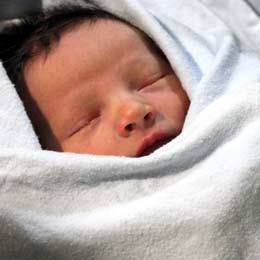Protecting Your Child
As parents and caregivers, you are concerned about the health and safety of your children. You take many steps to protect them — installing child-proof door latches, car safety seats and many more. Vaccines also work to protect you and your children from illness and death caused by infectious diseases.
Vaccines Protect Us from Infectious Diseases
Evidence shows that vaccines:
- Slow down, or stop disease outbreaks
- Protect those who are vaccinated against dangerous diseases
Infectious Diseases Have an Expensive Impact
Often time, diseases can be warded off through the protection of vaccines. The impact is significant and costly for families.
Children may:
- Require more healthcare visits
- Need to be hospitalized …and parents miss time from work.
You are fortunate to have vaccines available to you and your children. Vaccines can help you and your children stay healthy for a lifetime.
The Importance of Your Immunization Records
Keep the Records in a Safe Place
Because your child’s vaccination records are extremely important, ask your healthcare provider for a copy, so you can keep them somewhere safe at home.
Keep them Up-to-Date
If your child sees a regular pediatric healthcare provider, your child’s vaccination record will usually be kept at the office. But if you switch providers or move, remember to
have a copy of your child’s vaccination record and to bring it with you.
What if Your Child’s Immunization Records are NOT Available or Up-to-Date?
Consider the consequences of not having your child’s immunization records available, or up-to-date:
- Your child may not be able to start day care or school on time.
- You and your child may have a longer wait in the healthcare provider’s office.
- Your child may be excluded from school activities.
- During an outbreak of a disease, you would not know if your child was protected.
- Your child may have to start all of his/her vaccinations over again.
- An interruption may occur in your child’s vaccination schedule, while your healthcare provider tries to track down your child’s records - leaving your child unprotected against serious diseases.
Vaccinations: Stay on Schedule
First Year
- Diphtheria, Tetanus, and Pertussis (DTaP) (3 doses)
- Inactivated Poliovirus (IPV) (3 doses)
- Haemophilus Influenzae type b (Hib) (2 or 3 doses)
- Hepatitis B (3 doses)
- Pneumococcal Vaccine (3 doses)
- Rotavirus (3 doses)
- Influenza (Flu shot - after 6 months of age, 2 doses)
After Age
1 Year
- Varicella (Chicken Pox) (2 doses after age one yr. and again after age 4 yrs.)
- Measles, Mumps, Rubella (MMR) (2 doses - usually after age one yr. and again after age 4 yrs.)
- Hepatitis A (2 doses- 6 months apart)
- Diphtheria, Tetanus, and Pertussis (DTaP) (2 doses – after age one yr. and again after age 4 yrs.)
- Pneumococcal Vaccine (once)
- Haemophilus Influenzae type b (Hib) (once)
- Influenza (Flu shot/nasal mist every year. May need 2 doses for the first vaccination)
- Inactivated Poliovirus (IPV) (once after age 4 yrs.)
After Age
11 Years
- Tetanus, Diphtheria, and Pertussis (Tdap) (once)
- Human Papillomavirus (HPV) (for girls – 3 doses) (can be given at 9 or 10 years)
- Meningococcal Disease (MCV4) (once)
- Influenza (Flu shot/nasal mist every year)
Routine Vaccinations We Provide
-
Diphtheria, Tetanus, and Pertussis (DTaP)
Diphtheria, tetanus, and pertussis are serious diseases caused by bacteria. Diphtheria and pertussis are spread from person to person. Tetanus enters the body through cuts or wounds.
-
Hepatitis A
Hepatitis A is a serious liver disease caused by the hepatitis A virus (HAV). HAV is spread from person to person through contact with the feces (stool) of people who are infected, which can easily happen if someone does not wash his or her hands properly.
-
Hepatitis B
Hepatitis B is a serious disease that affects the liver. It is caused by the hepatitis B virus. Hepatitis B can cause mild illness lasting a few weeks, or it can lead to a serious, lifelong illness.
-
Hib (Haemophilus Influenzae Type B)
Haemophilus influenzae type b (Hib) disease is a serious disease caused by bacteria. It usually affects children under 5 years old. It can also affect adults with certain medical conditions.
-
HPV
HPV vaccine prevents infection with human papillomavirus (HPV) types that are associated with many cancers.
-
Influenza - Inactivated
Influenza or “flu” is a contagious disease that spreads around the United States every year, usually between October and May.
-
Measles, Mumps, Rubella (MMR)
Measles, Mumps, Rubella, and Varicella (chickenpox) can be serious diseases. These diseases can spread from person to person through the air. Varicella can also be spread through contact with fluid from chickenpox blisters.
-
Measles, Mumps, Rubella & Varicella (MMRV)
Measles, Mumps, Rubella, and Varicella (chickenpox) can be serious diseases. These diseases can spread from person to person through the air. Varicella can also be spread through contact with fluid from chickenpox blisters.
-
Meningococcal Conjugate Vaccines (MCV)
Meningococcal disease is a serious illness caused by a type of bacteria called Neisseria meningitidis. It can lead to meningitis (infection of the lining of the brain and spinal cord) and infections of the blood.
-
Serogroup B Meningococcal (MenB)
Meningococcal disease is a serious illness caused by a type of bacteria called Neisseria meningitidis. It can lead to meningitis (infection of the lining of the brain and spinal cord) and infections of the blood.
-
Pneumococcal Conjugate (PCV13)
Pneumococcal disease is caused by bacteria that can spread from person to person through close contact. It can cause ear infections, and it can also lead to more serious infections .
-
Polio
Polio is a disease caused by a virus. It is spread mainly by person-to-person contact. It can also be spread by consuming food or drinks that are contaminated with the feces of an infected person.
-
Rotavirus
Rotavirus is a virus that causes diarrhea, mostly in babies and young children. The diarrhea can be severe, and lead to dehydration.
-
Tdap (Tetanus, Diphtheria, Pertussis)
Tetanus, diphtheria, and pertussis are very serious diseases. Tdap vaccine given to pregnant women can protect newborn babies against pertussis.
-
Varicella (Chickenpox)
Chickenpox (also called varicella) is a common childhood disease. It is usually mild, but it can be serious, especially in young infants and adults.
Immunization Schedules from the CDC
Easy-to-read formats to print, tools to download, and ways to prepare for your office visit.




















